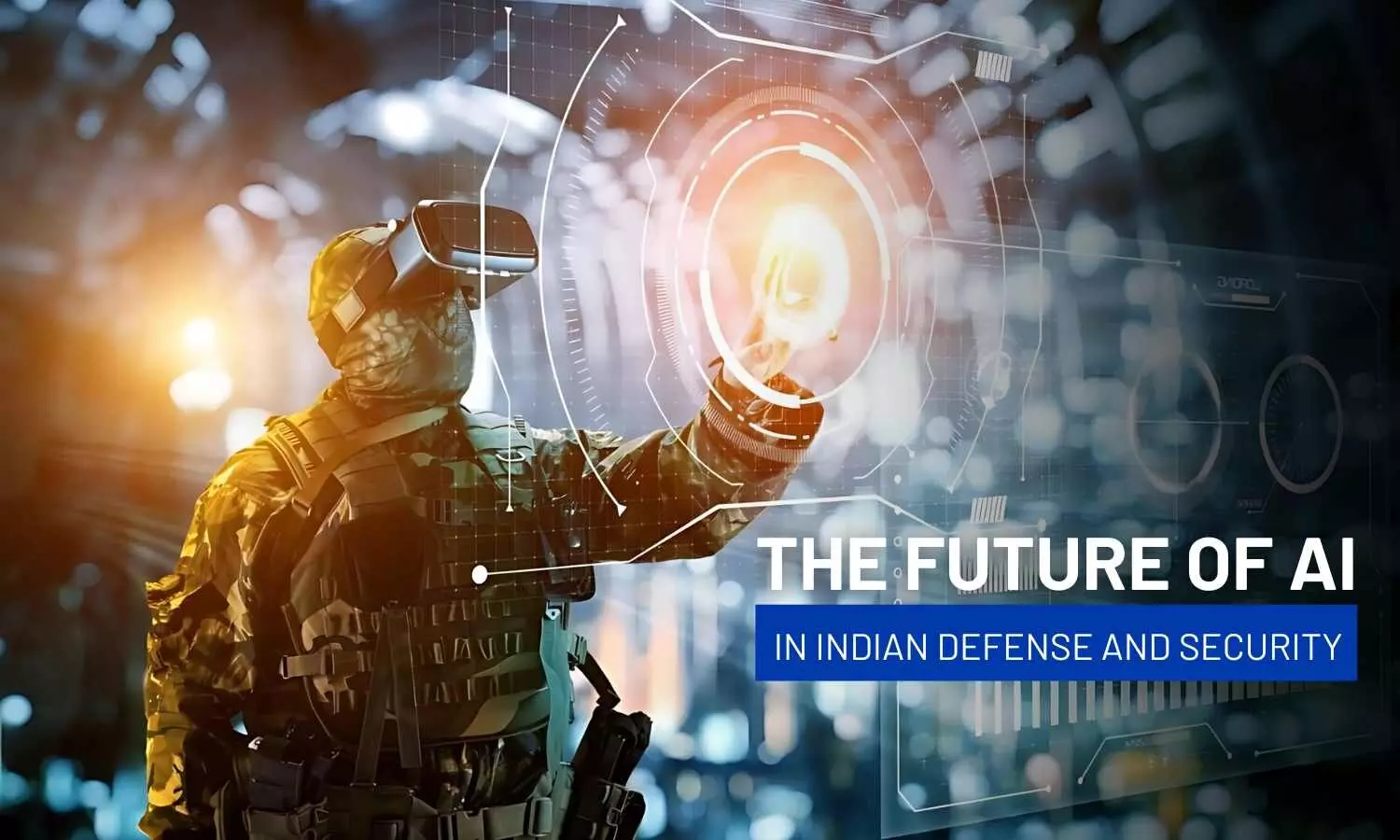AI-Powered Defence: India's Strategic Leap Into The Future
AI adoption is transforming India's defence landscape, giving it a possible operational advantage while improving border security.
AI-Powered Defence: India's Strategic Leap Into The Future

Living in an era where change is constant, the introduction of Artificial Intelligence (AI) has altered all industries throughout the globe. In reality, according to IDC, AI and Gen AI usage in India has expanded dramatically, encompassing software services and hardware for AI-centric systems, with spending expected to reach $6 billion at a CAGR of 33.7% between 2022-2027. Although still in its nascent stages, AI's potential is vast, particularly in structured activities.
Similar to other industries, the power of AI has changed the defence sector, redesigning modern warfare.
Currently, AI-based technologies are utilised for training, surveillance, logistics, cybersecurity, UAVs, and advanced military weaponry such as the Lethal Autonomous Weapon Systems (LAWS). This is where, as the country experiences shifts in defence and security threats, AI is positioned to play a critical role in strengthening India's military capabilities, intelligence collection, and national security.
AI uncountably reigns supreme, so let's delve into the future of AI in Indian defence and security, exploring the potential application, challenges that lie ahead, and government initiatives that have paved the way for technology in the sector.
Application of AI in Defence
The most important application of AI in defence is surveillance and intelligence. Thus, with the ability to analyse massive amounts of data from numerous sources, including satellites and drones, AI-powered systems identify possible dangers and follow adversary activity.
Autonomous weapon systems are next in line. This tool, which is being created using AI algorithms, will automate a variety of military operations. These systems may include unmanned aerial aircraft (UAVs), self-driving cars, and naval boats.
While there are ethical problems concerning the deployment of autonomous weapons, their potential to perform day and night surveillance missions should not be underestimated.
The start of AI-powered systems has transformed India's cybersecurity landscape. It has enabled proactive defence against escalating cyber threats, detecting and responding to cyber threats in real-time. Furthermore, AI-powered information operations have allowed Indian defence forces to execute strategic cyber operations that impair opponent networks while protecting national interests.
In addition, India has made significant strides in AI research and development. The government has launched several initiatives to promote AI adoption in the defence sector, including the National AI Mission and the Defence Research and Development Organisation (DRDO).
Government Initiative
The military's use of technology dates back to the early 2000s, when the Indian government established the Defence Research and Development Organisation (DRDO). Its mission was to deliver cutting-edge technology to the armed forces, achieve self-reliance in vital defence technologies, and provide state-of-the-art weapon systems and gear based on service requirements.
Over the years, the Indian military has integrated AI to enhance its capabilities. As a result, on July 11, 2022, the Indian Defence Minister, Rajnath Singh, unveiled 75 newly developed AI technologies during the 'AI in Defence' (AIDef) exhibition in New Delhi. Furthermore, the government has also explored AI for the underwater domain, demonstrating an AI-enabled swarm of 75 aerial drones for reconnaissance purposes in 2021.
The Indian army has not only established initiatives but also developed various innovations. Among other notable advancements are the development of the Enhanced Collaborative Autonomous Rover System (ECARS), an unmanned ground vehicle, and a multipurpose robotic "buddy." Its perception modules provide full unmanned control, which improves operational capabilities and reduces risks in important missions, ensuring our forces' safety.
The Ministry of Defence (MoD) has also allocated INR 100 crore to the Defence Artificial Intelligence Project Agency (DAIPA) over the next five years. This cash will go to AI projects, infrastructure development, data preparation, and capacity building, ushering in a new era of advanced AI innovation.
Ethical Considerations
While AI has so many pros in defence and security, there are also challenges and ethical considerations to be addressed. Some of the key challenges are:
- The employment of autonomous weaponry raises concerns regarding the possibility of unintended injury and a loss of human control.
- AI, while utilised to improve cybersecurity, can also be employed by adversaries to launch more sophisticated assaults.
- Large-scale data collection and processing can generate privacy and surveillance concerns.
Path Towards Future!
India can increase its capabilities, operational efficiency, and national security by leveraging AI-powered technology. Thus, to guarantee that AI is used responsibly and effectively, it is critical to address the ethical issues that come with it.
In addition, the application of AI in military service is a two-edged sword. So, it is critical to use it wisely.
Therefore, the future of defence is more than just weapons and strategy; it is also about harnessing the potential of AI to generate safer and more secure action.

